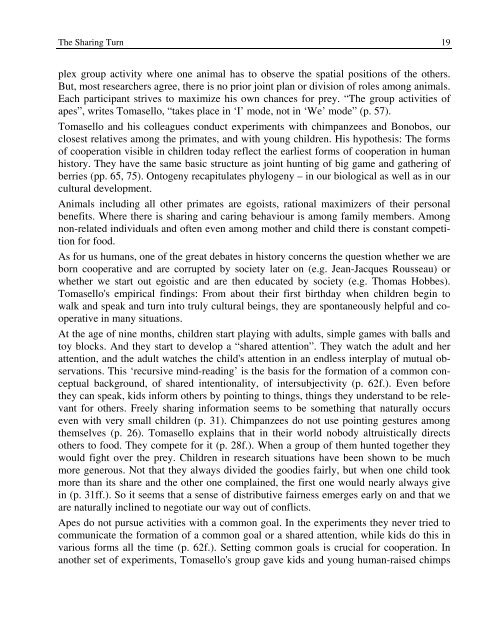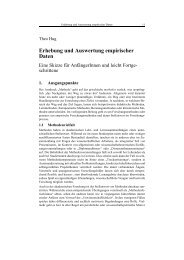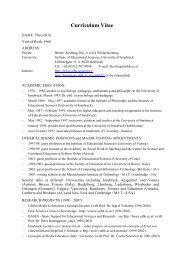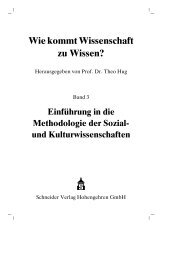Cultures and Ethics of Sharing - Universität Innsbruck
Cultures and Ethics of Sharing - Universität Innsbruck
Cultures and Ethics of Sharing - Universität Innsbruck
- Keine Tags gefunden...
Erfolgreiche ePaper selbst erstellen
Machen Sie aus Ihren PDF Publikationen ein blätterbares Flipbook mit unserer einzigartigen Google optimierten e-Paper Software.
The <strong>Sharing</strong> Turn 19plex group activity where one animal has to observe the spatial positions <strong>of</strong> the others.But, most researchers agree, there is no prior joint plan or division <strong>of</strong> roles among animals.Each participant strives to maximize his own chances for prey. “The group activities <strong>of</strong>apes”, writes Tomasello, “takes place in ‘I’ mode, not in ‘We’ mode” (p. 57).Tomasello <strong>and</strong> his colleagues conduct experiments with chimpanzees <strong>and</strong> Bonobos, ourclosest relatives among the primates, <strong>and</strong> with young children. His hypothesis: The forms<strong>of</strong> cooperation visible in children today reflect the earliest forms <strong>of</strong> cooperation in humanhistory. They have the same basic structure as joint hunting <strong>of</strong> big game <strong>and</strong> gathering <strong>of</strong>berries (pp. 65, 75). Ontogeny recapitulates phylogeny – in our biological as well as in ourcultural development.Animals including all other primates are egoists, rational maximizers <strong>of</strong> their personalbenefits. Where there is sharing <strong>and</strong> caring behaviour is among family members. Amongnon-related individuals <strong>and</strong> <strong>of</strong>ten even among mother <strong>and</strong> child there is constant competitionfor food.As for us humans, one <strong>of</strong> the great debates in history concerns the question whether we areborn cooperative <strong>and</strong> are corrupted by society later on (e.g. Jean-Jacques Rousseau) orwhether we start out egoistic <strong>and</strong> are then educated by society (e.g. Thomas Hobbes).Tomasello's empirical findings: From about their first birthday when children begin towalk <strong>and</strong> speak <strong>and</strong> turn into truly cultural beings, they are spontaneously helpful <strong>and</strong> cooperativein many situations.At the age <strong>of</strong> nine months, children start playing with adults, simple games with balls <strong>and</strong>toy blocks. And they start to develop a “shared attention”. They watch the adult <strong>and</strong> herattention, <strong>and</strong> the adult watches the child's attention in an endless interplay <strong>of</strong> mutual observations.This ‘recursive mind-reading’ is the basis for the formation <strong>of</strong> a common conceptualbackground, <strong>of</strong> shared intentionality, <strong>of</strong> intersubjectivity (p. 62f.). Even beforethey can speak, kids inform others by pointing to things, things they underst<strong>and</strong> to be relevantfor others. Freely sharing information seems to be something that naturally occurseven with very small children (p. 31). Chimpanzees do not use pointing gestures amongthemselves (p. 26). Tomasello explains that in their world nobody altruistically directsothers to food. They compete for it (p. 28f.). When a group <strong>of</strong> them hunted together theywould fight over the prey. Children in research situations have been shown to be muchmore generous. Not that they always divided the goodies fairly, but when one child tookmore than its share <strong>and</strong> the other one complained, the first one would nearly always givein (p. 31ff.). So it seems that a sense <strong>of</strong> distributive fairness emerges early on <strong>and</strong> that weare naturally inclined to negotiate our way out <strong>of</strong> conflicts.Apes do not pursue activities with a common goal. In the experiments they never tried tocommunicate the formation <strong>of</strong> a common goal or a shared attention, while kids do this invarious forms all the time (p. 62f.). Setting common goals is crucial for cooperation. Inanother set <strong>of</strong> experiments, Tomasello's group gave kids <strong>and</strong> young human-raised chimps








